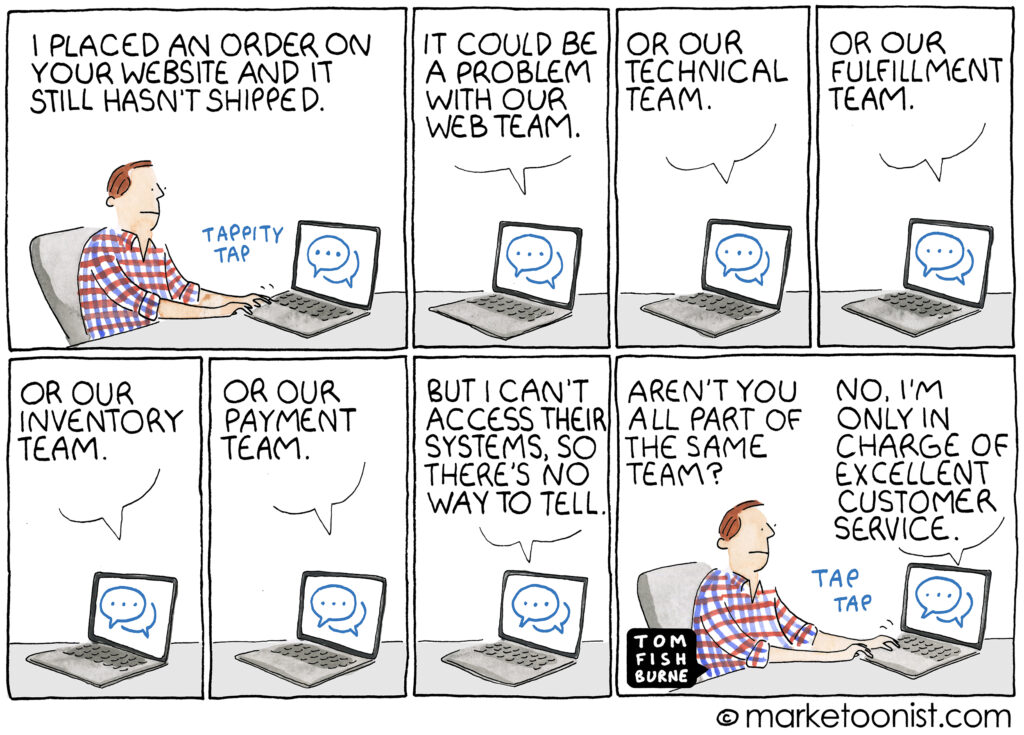Ever had an experience as a customer that left you with a poor opinion or feeling toward a business? Maybe the internet provider made you explain your issues several times to several different agents or the restaurant with consistently slow service. Your internet could be fast, and your meal may have been delicious, but your experience with the business was negative. Customer experience is a customer’s overall experience with an organization, brand, or business.
Customer experience is often confused with customer service: individual moments where an employee is directly providing service to a customer. A company may provide good customer service while still leaving their customer with a bad experience. Although good customer service is important, it’s just one component of creating a good customer experience.

“64% of consumers, according to Salesforce research, expect companies to interact with them without delay.”
Due to the increase in on-demand services, consumers have become used to interacting with brands via channels of their choice (including phone, email, web, and social media) and expect responses in a timely manner. 64% of consumers, according to Salesforce research, expect companies to interact with them without delay. The same research shows that 80% of business buyers expect the same. When a brand fails to meet these expectations, its customer experience is damaged. Thinkjar research shows that 55% of consumers are willing to pay more for guaranteed good customer experiences and are no longer satisfied with just the idea or promise of a good experience. The competitive advantage of providing a great customer experience is one that cannot be ignored.
“55% of consumers are willing to pay more for guaranteed good customer experiences and are no longer satisfied with just the idea or promise of a good experience.“
Salesforce research also tells us that 76% of people expect a consistent experience when interacting with brands on various channels. This is called omnichannel customer experience and involves tracking an entire customer journey across channels, thereby creating a consistent and optimized experience.
Customers want to have the freedom to switch between different channels without hassles such as loss of information or the need to repeat existing information. Omnichannel customer experience not only leads to more satisfied customers but also customer insights from collected data, the ability to deliver personalized customer experience tailored to each individual, and predicting consumer behaviour for driving customer engagement. Combined, these greatly help with up-selling and cross-selling.
“Salesforce research also tells us that 76% of people now expect a consistent experience whenever interacting with brands on various channels.”
As someone with a background in managing customer experience, I’m always frustrated when a company neglects simple steps to improve my experience as a customer.
Customer experience begins when a person first becomes aware of a business and continues as they progress through the buying process, use the product or service, and include any dealings with the company or its products and services during and after. From the first advertisement seen, peer recommendation heard or when a cool item is spotted in a store, the customer experience begins.
Providing a great customer experience requires truly understanding the customer and their wants and needs, having a plan for great customer service, and empowering employees who then make sure to consider the customer and their experience in every aspect of their work.
Customer experience is an economic benefit to a business – it turns customers into a brand’s champions, returning again and again while singing a brands praises. Poor customer experience means fewer returning customers or longtime clients and usually fewer happy and fulfilled employees.
